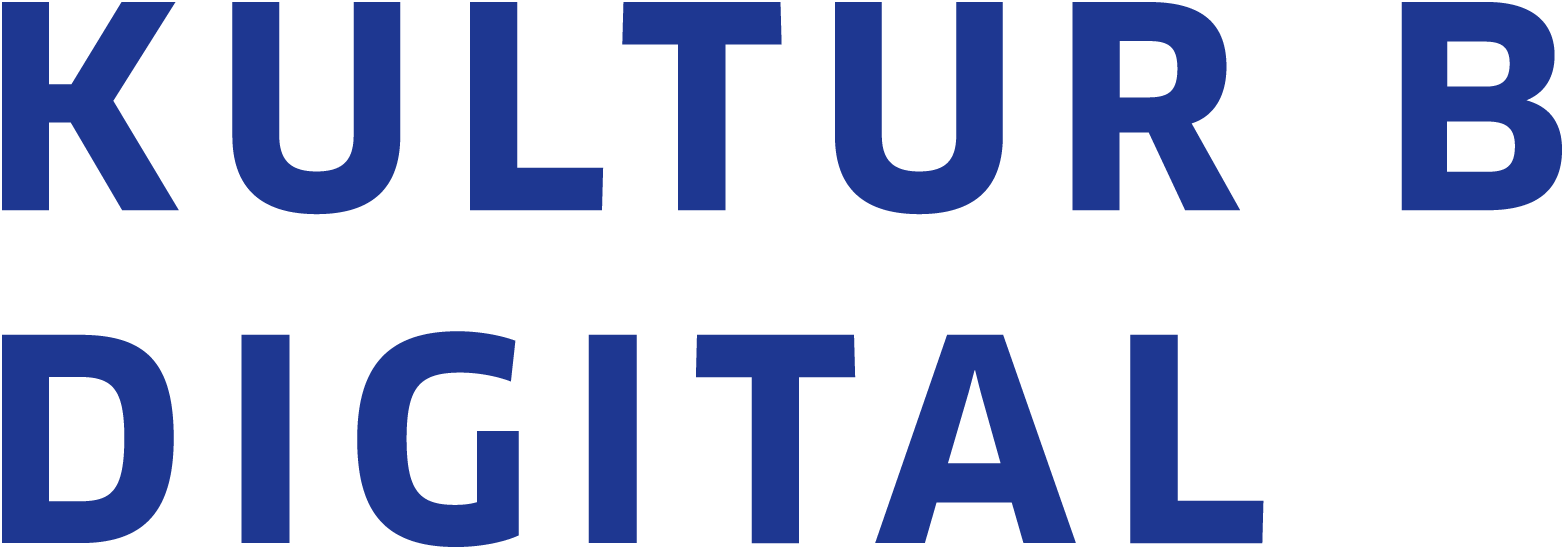Around 170 participants attended the 4th conference on digital development in the cultural sector, an event organised by kulturBdigital in Berlin’s Kreuzberg district.
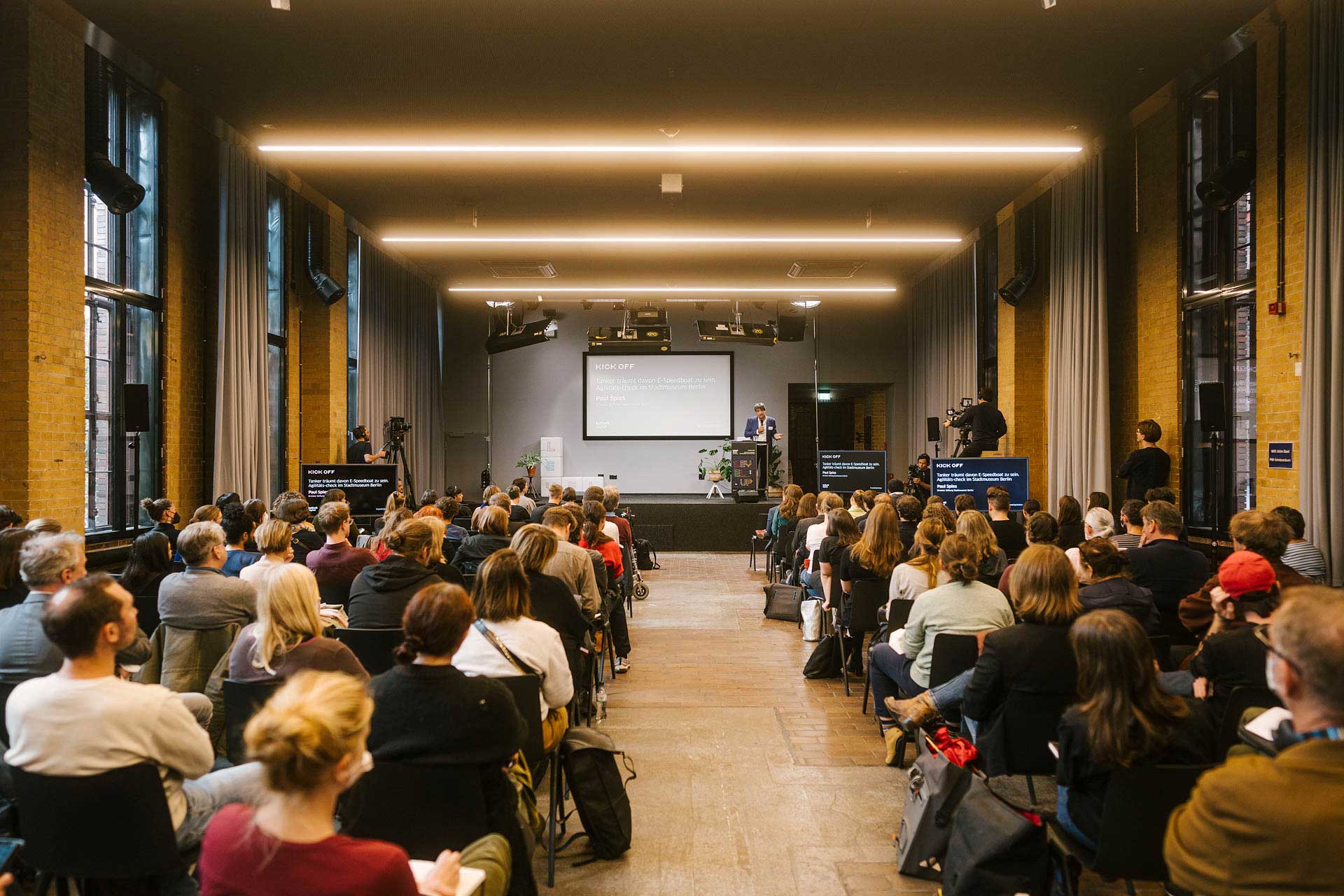
Why LevelUp?
Fast-changing digitality has forced many areas of society to respond in recent years, and culture is no exception. A new working world of processes, tools and technologies is taking shape both in front of and behind the scenes of cultural institutions, one that is every bit as dynamic as digital society itself. “A lot of things were tried out more or less voluntarily, quite a few were abandoned and even more were found to be useful for further work,” noted Annette Kleffel, director of networks and cooperation at Technologiestiftung Berlin and project manager for kulturBdigital. Recent months have seen a rise in remote working, streamed online performances over live, on-site ones and a broad range of novel digital formats and programmes – but they’ve also shined a light on insufficient digital infrastructure and lacking communication channels and resources. Bearing this in mind, LevelUp offers a “look at the situation as it stands, at working methods, learning processes and personnel requirements”, as project manager Silvia Faulstich put it. The key question is, “How do we manage that leap to the next level from what has already been tried out?” It has everything to do with the roles and competencies required of cultural actors, about effective learning models and providing answers to questions as to which infrastructures can help cultural workers in their day-to-day professional context.
kulturBdigital, a cooperation between the technology-focused non-profit foundation Technologiestiftung Berlin and the Senate Department for Culture and Europe, welcomed experts and cultural professionals to its 4th conference on 21 September 2022. Participants shared experiences, ideas and offered stimulating input in lectures and discussions.
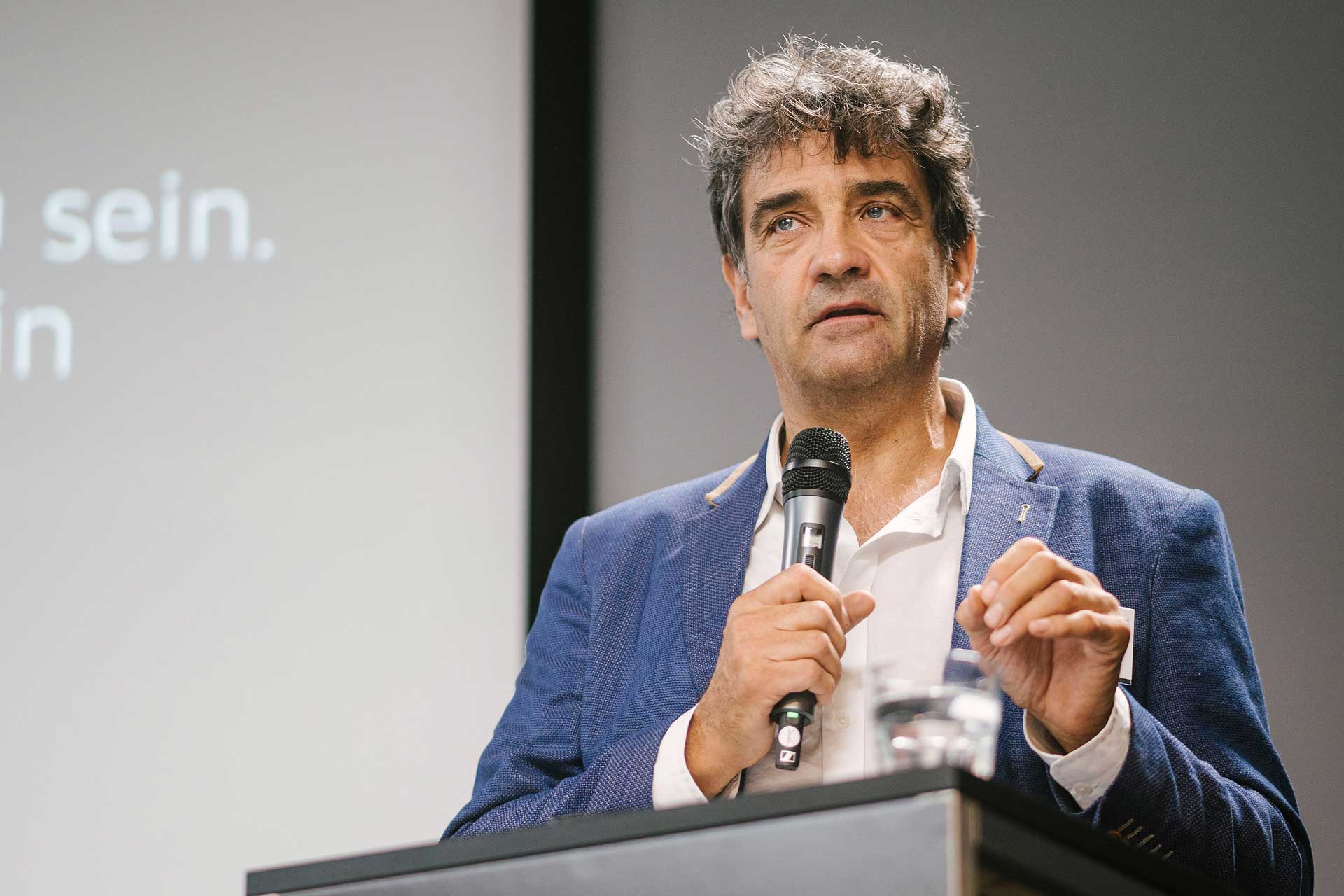
Tanker dreams of being an e-speedboat
German organisational structures have been and continue to be the biggest challenge for Paul Spies, a member of the board and director of the Stadtmuseum Berlin since 2016 as well as chief curator of the Federal State of Berlin at Humboldt Forum. “Compared to Holland, Germany seems more like a tanker,” the Dutch art historian said of his experience. “But we want to be a speedboat.” The Stadtmuseum should be a place where one can enter into a dialogue with society, he noted. Consequently, the Spies-curated exhibition “Berlin Global” at Humboldt Forum puts a premium on visitor participation. Visitors can interactively experience how the city is connected to the world. What is important, however, is not only that the exhibitions are made digital, but also the organisation behind them. Spies regrets that too much of the work at the Stadtmuseum, a state-owned institution, is being done on old-fashioned systems. He has countered this with an overall restructuring of the institution’s organisation: Spies views flatter hierarchies and a greater sense of personal responsibility among staff as central to creating a more sustainable, viable organisation.
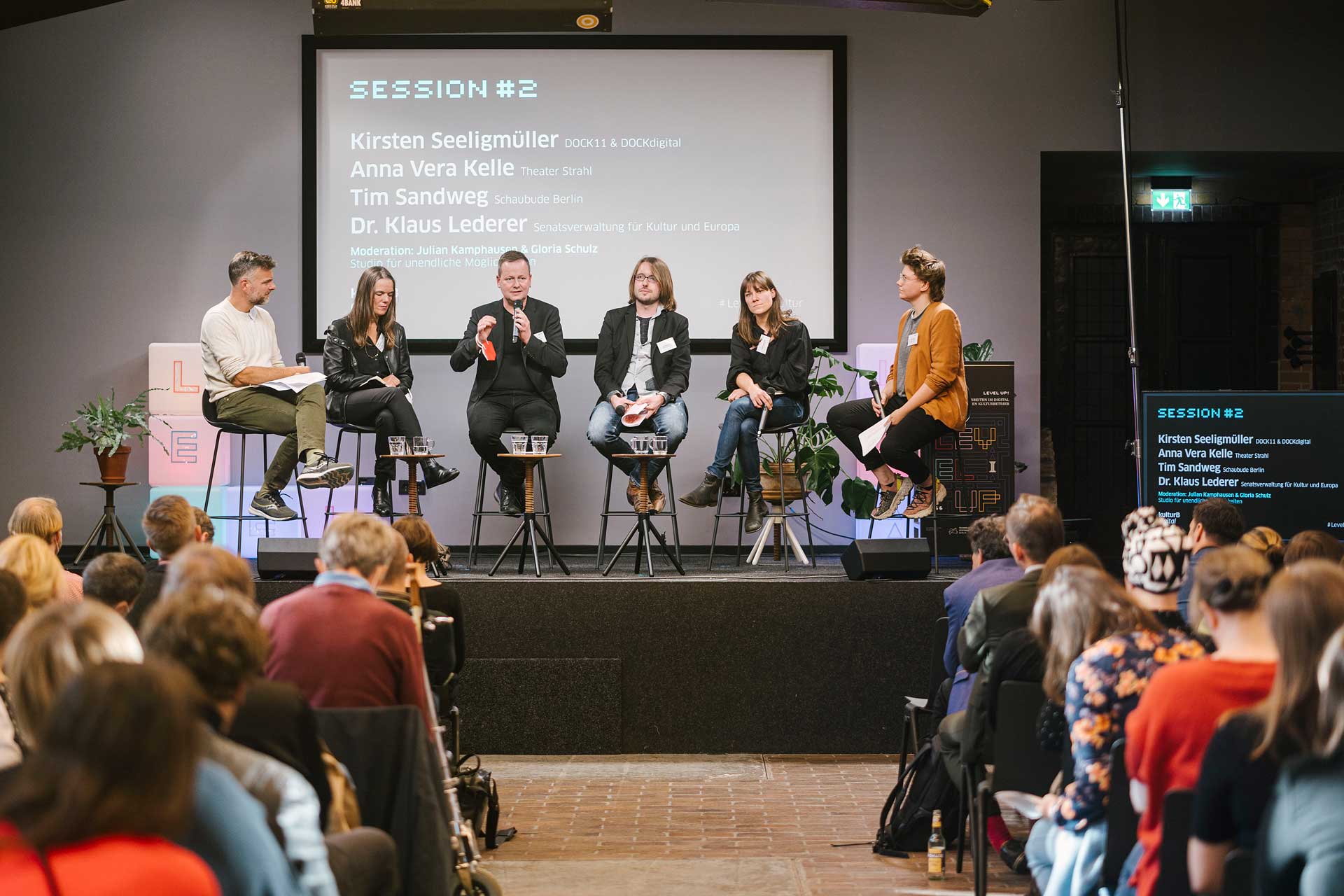
Giving new momentum
Dr Klaus Lederer, Berlin Senator for Culture and Europe, addressed what he views as the progress made in digitisation since 2018. “We’ve funded projects that have created infrastructures and spaces.” He noted how Innovationsfonds Berlin, a funding programme, has made it possible to secure money directly and specifically for digitisation projects in the Berlin cultural scene. Lederer named the digital arts venue Prater Digital; a digital ticketing system for institutions including the Kolbe Museum; and the digital theatre stage at HAU Hebbel am Ufer (which is now being made permanent), as examples. Another major success, he said, was the creation of 70 positions for digital managers – so-called resilience dispatchers – at cultural institutions. “These positions were created to change the mindset.” Lederer also pointed to the momentum-giving potential of kulturBdigital, an ongoing cooperation between his institution and Technologiestiftung Berlin, and its continuance until 2026.
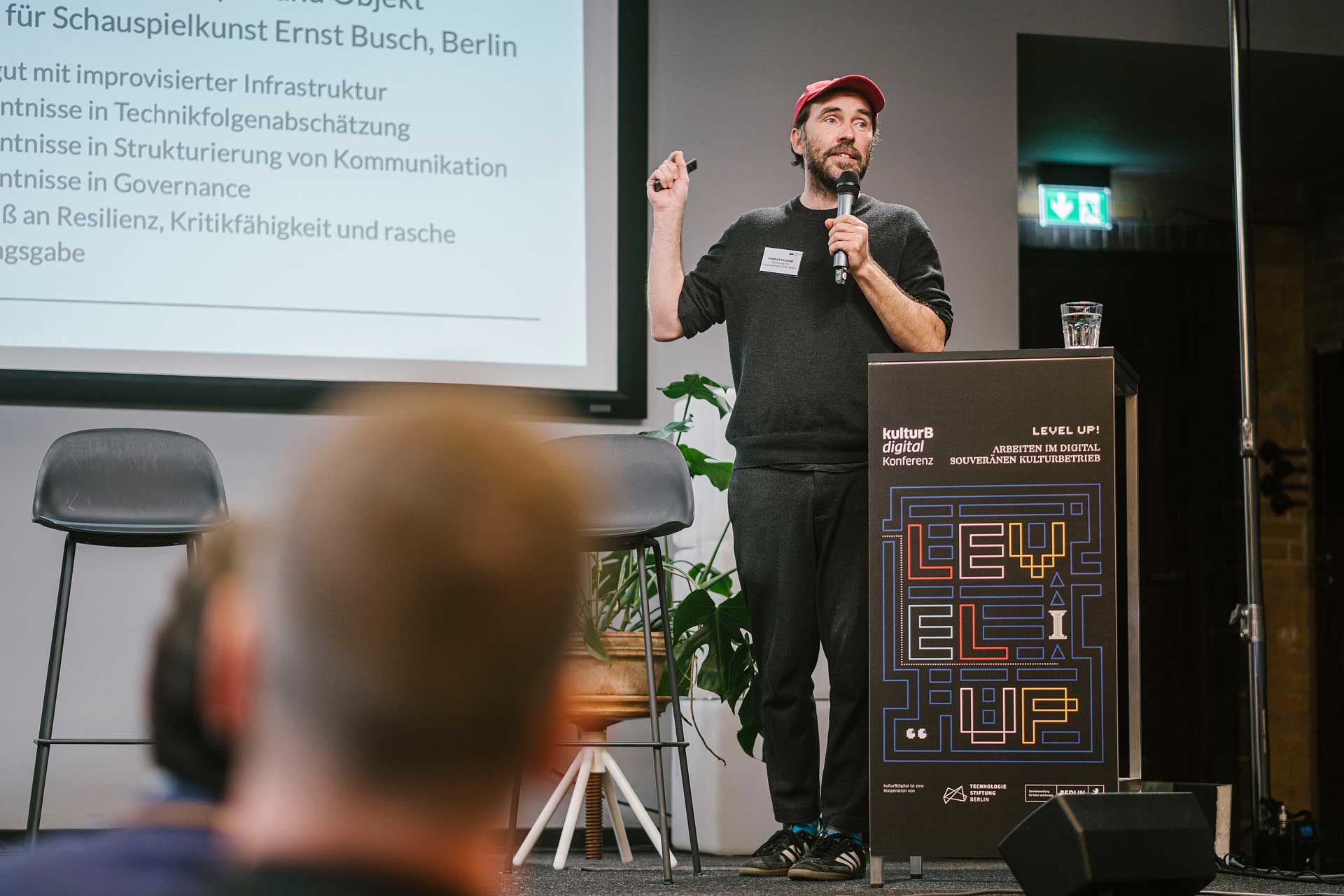
What workforce needs and roles are emerging in the digitally-savvy cultural sector?
The challenges posed by digitalisation in the world of cultural sector work are undoubtedly many and varied. At the heart of the issue is the question of which people, with which qualifications and experience, are needed to master them sustainably.
The Museum für Naturkunde, for example, has created positions for cataloguing managers responsible for digitising its 30 million objects. Their task is to holistically sort and organise the natural history museum’s complex inventory, conservation efforts, digitization and further processing (in databases) procedures, in addition to sorting the various functions and competencies of the cataloguing team. Dr Frederik Berger and Franziska Schuster of the MfN spoke about the job profile and initial positive experiences, as well as “the scepticism that tried and tested approaches will get lost”. (Schuster)
Friedrich Kirschner, a professor at the Ernst Busch Academy of Dramatic Arts, highlighted the discrepancy between the job description and requirements listed in public sector calls for application versus the actual requirements of the role. “The essential things as opposed to the things that are not in the call for applications, because a professorship at the public drama conservatory is really about something completely different, that is one of the biggest difficulties.”
What (free) spaces does transformation require?
Change needs space to happen. But what environments actually encourage new kinds of collaboration, what infrastructures really help people as they try things out, learn to think differently or implement those changes? Senator Klaus Lederer joined Anna Vera Kelle of Theater Strahl, Kirsten Seligmüller of DOCK 11/DOCKdigital and Tim Sandweg of Schaubude Berlin for a discussion on the topic.
Senator Lederer described one prerequisite as follows: “The team needs intrinsic motivation to do something.” Anna Vera Kelle’s advice: “Perform, even if not everything is ready.” Actors fear digitalisation, and that fear should be alleviated: “Actors worry that digital projects will leave them out of the picture.” All of the panellists agreed that workshops, prototypes and labs are “super important” – “labs without an objective are outstanding for finding good people” (Seeligmüller); they also create “personal realms of possibility” for staff (Kelle). One key insight for Tim Sandweg during the pandemic was the importance of emotional labour. “How do you get everyone on board with what you’re doing? And how do you iron out disagreements?”
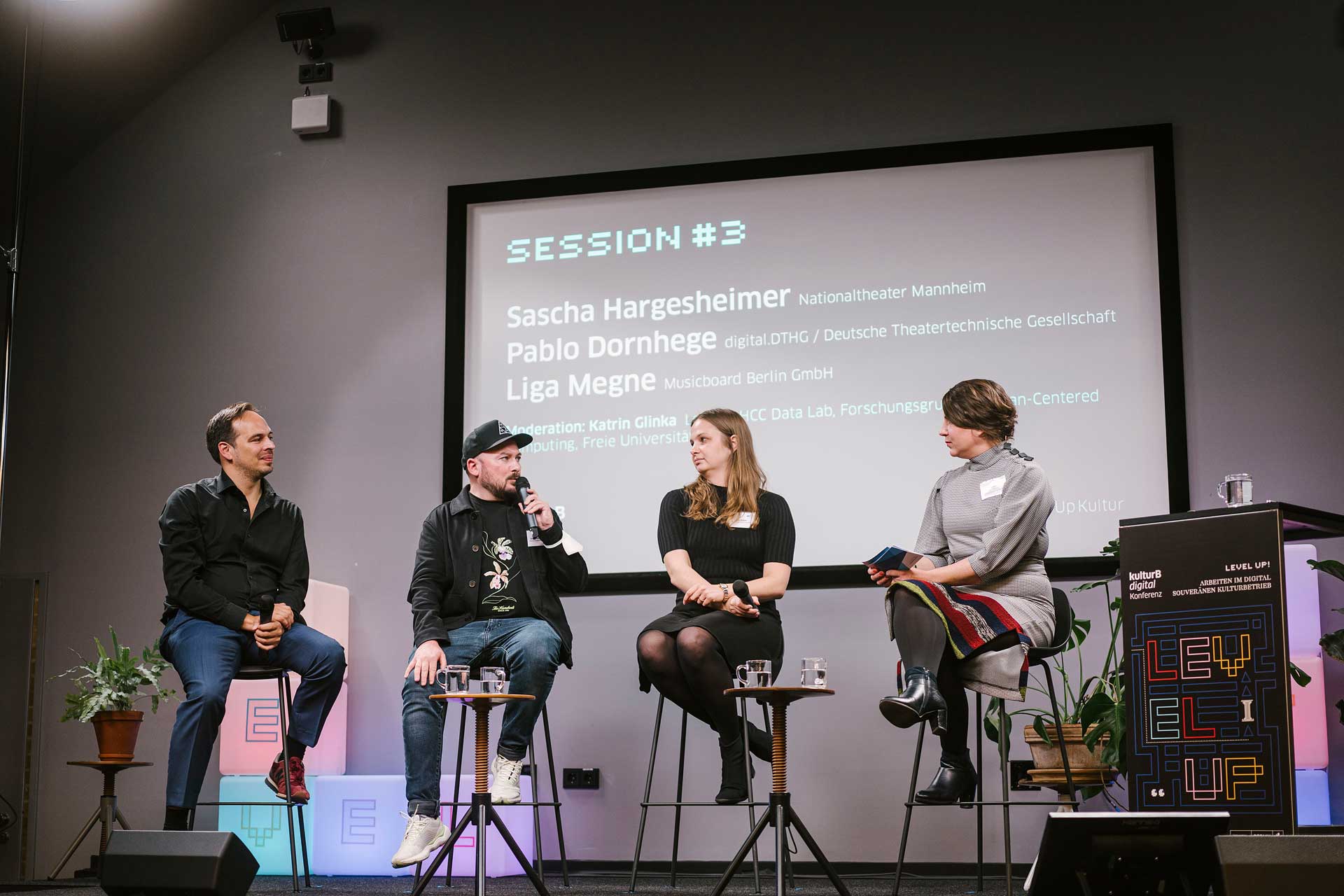
How is knowledge retained?
“How do I convince team members of the extra work they have to do when it involves sharing know-how with their potential replacements?” The question arose in a discussion with Sascha Hergesheimer of the Nationaltheater Mannheim; Pablo Dornhege of digital.DTHG / Deutsche Theatertechnische Gesellschaft and Liga Megne of Musicboard Berlin GmbH. Often, when a project is over, any knowledge gained in the course of that project disappears as well. Fluctuation and turnover in the cultural sector often means a loss of expertise. Liga Megne underscored the urgency of documentation, especially in the case of remote work. The handbook-first method is crucial. “That means write it down first, then talk about it, then ask. People should be able to look up anything they want to know.” Pablo Dornhege relies on “persistent friendliness” to convince everyone in the institution to acquire and pass on new knowledge. Sascha Hergesheimer advocates developing the competencies of one’s own staff. Any project should consider where the expertise should come from. It is only when personnel or financial resources are lacking that he considers outsourcing technical tasks.
Avatars and agents
Discussions and keynote lectures in the auditorium were flanked by casual conversations during the breaks and artistic presentations. DOCKdigital Lab and Nico and the Navigators presented the AR Loop Machine, for example: augmented reality glasses were used to watch avatars dance and create coloured patterns in the room. See the DOCK11 website for more information.
Tobias Witt of CityLAB Berlin presented the “Service Agent:innen” project at a meet-up. The project involved the creation of a handbook for administrations that includes methods for agile and digital working. After all, as Witt explained, “Berlin’s administration can be reformed,” it’s just a matter of starting with small steps and projects. Agile working methods were developed using real administration processes – a service design concept in 8 modules. For details, see the Service-Agent.innen project website (in German).
The conference’s 4th edition proved a successful networking event overall: the kulturBdigital Lab team at Technologiestiftung Berlin welcomed around 170 registered participants to a lively dialogue on the new world of work in the cultural sector.
In the words of one participant at the end of the day: “Best conference ever!”
Text: Thomas Prinzler
Translation: Kirsten Heininger
More
1st conference on digital development in the cultural sector
2nd conference on digital development in the cultural sector
3rd conference on digital development in the cultural sector
